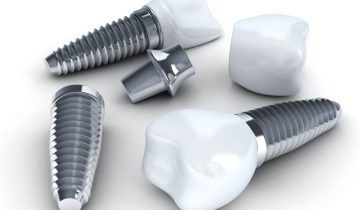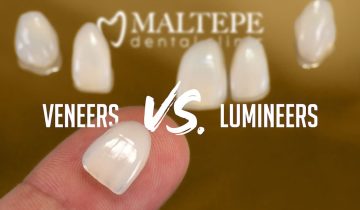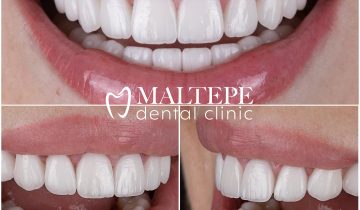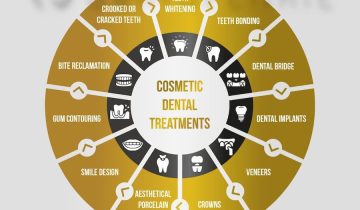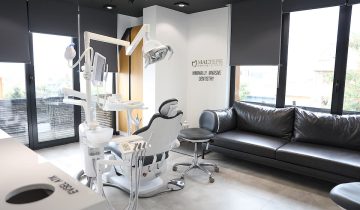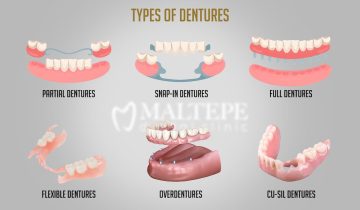Last updated on October 18th, 2023
What Are Full Dentures? A Comprehensive Guide
Missing all your teeth can be a great challenge for many. It can affect your life in several ways. Aside from the problems with biting and chewing, when someone loses his/her teeth, their facial appearance can change dramatically, cheeks get sunken, and the skin may wrinkle around the mouth. Missing teeth can lead to difficulties in speaking, too.
Fortunately, full mouth restorations such as full dentures can replace all missing teeth in the upper or lower jaw. By maintaining the natural appearance of the gum line and jaw structure, patients can achieve a better smile while gaining self-confidence.
In this post, we aim to clarify all key points regarding full dentures. You will learn about the material types, caring routines, advantages and disadvantages, and many other things about full dentures.
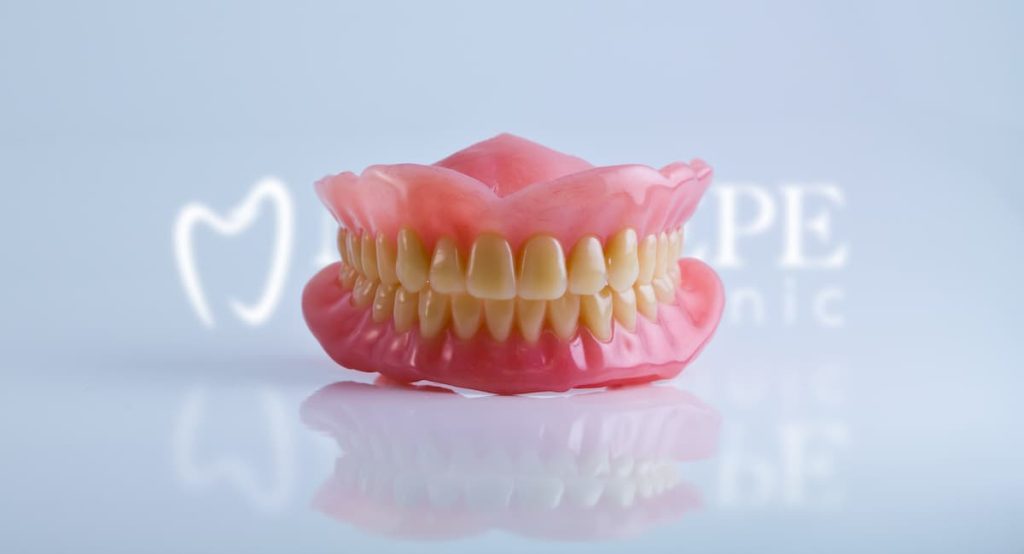
What Are Full Dentures Made Of?
There are two popular materials used to make dentures: acrylic and porcelain.
Acrylic is a hybrid resin composite, which is a long-lasting base material for dentures that is easy to shape. Since it is not as hard as porcelain, acrylic full dentures might be a better option for those who are concerned about making adjustments in the future or damage to their natural teeth in the opposite arch. Another notable advantage of acrylic dentures is their relatively lower cost. The price of an acrylic denture is usually less expensive than that of a porcelain denture.
The other popular denture material is porcelain. It is an extremely hard and durable ceramic dental material. The feel and appearance of porcelain dentures are similar to that of natural teeth. Although they are relatively heavier, patients can still easily adapt to them. Patients opt for porcelain dentures when they need to have a full set that matches the hardness of any adjacent teeth. Note that porcelain dentures are usually more expensive than acrylic resin dentures.
How Do Full Dentures Work?
Complete dentures act as a replacement for natural teeth. Dentists fit them on the gum line carefully to guarantee the proper fit and feel. The basic principle of full dentures is to fit your mouth perfectly in terms of function and appearance. Therefore, full dentures are shaped carefully so that they can rest on the gum comfortably. For this reason, your dentist will take impressions of your jaw, and wax rims are made. Afterward, other points such as color, shape, and size of the teeth are planned. Finally, dentures are prepared and given to the patient. If it is the first time a patient is using dentures, he/she might need a few days to get used to them. After a few days of using the dentures, a dentist might need to do some adjustments to maximize the comfort and aesthetic appearance.
Full dentures support the face structure while restoring the patient’s bite, chewing, and speaking abilities. If the denture teeth are needed in the upper jaw, the upper palate is covered with a gum-like acrylic material to support the denture better. Though the full coverage of the upper palate is a bit uncomfortable for some patients, it is the best way to keep the dentures functioning at their best.
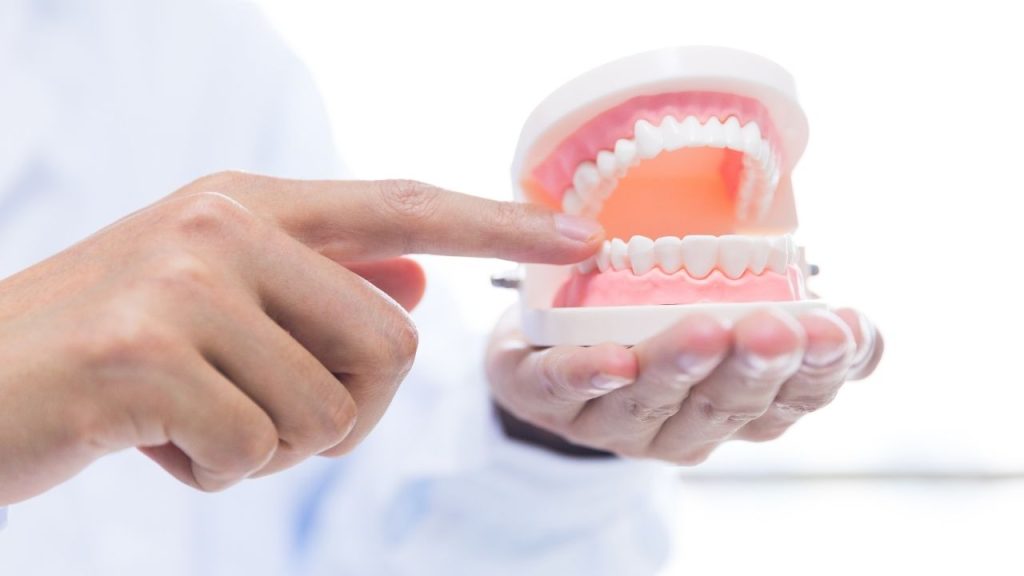
How Do Complete Dentures Affect Speech, Chewing Ability, and Comfort in the Short and Long Term?
Complete dentures improve speech and chewing ability mainly within the first month, with minor changes observed after 12 months and 3 years, according to a 2022 study published in the Stomatology Edu Journal, which explored self-perceived speech ability, chewing ability, and other factors in patients wearing complete dentures for up to 5 years. Initially, comfort may decrease, but it tends to stabilize after the first month and remains consistent up to a year. Orofacial esthetics generally remains unchanged until 3 years into denture use when a decline is noticed. Gender and prior denture experience don’t majorly affect these outcomes, though women reported better speech and chewing ability in the initial 15 days of denture wear.
Different Types Of Full Dentures
Full sets of dentures are usually applied in two ways, either regular dentures or immediate dentures. Regular dentures are recommended for patients with no teeth in their mouths. If the patient still has some teeth which are not in good condition, dentists may opt for immediate dentures. Immediate dentures can be applied the same day while the application of regular full dentures can take up to a few weeks to be completed.
Dentures might be categorized cost-wise, too. Premium dentures are those made to fit the patient’s jaw perfectly. They are custom-made and thus require less denture adjustment. But they are usually expensive. Economy dentures, on the other hand, are ideal for people who are on a budget. They are generic, so the patient and dentist have to find one that fits the patient’s mouth best. Though they are relatively more affordable, they need realignment or readjustment more frequently.
Benefits And Drawbacks Of Full Dentures
A full set of dentures are a great way to eliminate long-term problems with appearance, eating, and speaking. Full denture treatment is available in almost all dental clinics, with different types offered for various needs and expectations. However, you should still consider the downsides of any treatment before you make your final decision. In this section, you will find the most relevant pros and cons of full denture treatment.
Pros Of Full Denture:
- Full dentures are aesthetically pleasing. They look like natural teeth allowing you to smile more confidently.
- Full denture treatment requires no surgical procedure and is thus painless.
- It is cost-effective.
- It stops your face from looking sunken in.
- A full denture is still a possibility even if your jawbone and gums are not in optimal condition.
Cons Of Full Dentures:
- Full dentures wear down over time, and thus, need to be replaced eventually.
- The procedure may involve removing unhealthy teeth, and you might need to wait until the gums heal in order to continue. Therefore, you might require a couple of visits to your dentist to achieve the desired outcome.
- Since dentures are not permanent but removable applications, they might make noise if not fitted properly each day. This can make the patient feel embarrassed as well as give soreness.
Full Dentures Vs. Partial Dentures: Which Is Right For You?
Patients may come to a crossroads when evaluating the alternatives: full dentures or partial dentures. It is always best to discuss all the options with a dental professional. However, taking a few critical points into consideration will undoubtedly help you to understand which one is best suited to your needs.
A patient’s overall dental health and budget are two very important factors to consider. If your oral health is good, and you are only suffering from one or two missing teeth only, you can consider partial dentures instead. These are more affordable and practical for such situations. If you have multiple decayed teeth, or you don’t have any healthy teeth remaining, then a full denture treatment is the best choice for you. Depending on your case, a prosthodontist or dentist will give you a better consultation to decide the right treatment for you.
How To Care For Your Full Dentures?
Follow these steps to care for your full dentures:
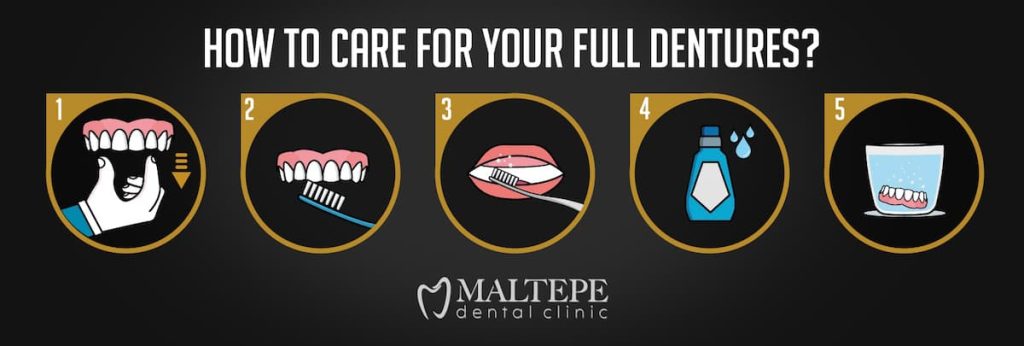
Remove Your Dentures: Remove your dentures once or twice a day. Do it gently.
Clean Them Manually: Clean your dentures using a soft-bristled toothbrush, some mild soap (or special denture cleaning solution), and some water.
Clean Your Gums: Don’t forget to clean your gums, too. You should remove the food debris from your mouth completely.
Rinse Your Mouth: Use mouthwash or water to rinse your mouth after cleaning your gums.
Soak Your Dentures: Soak your full denture in warm water or a soaking solution when you are not using them for more than a few hours, ideally overnight.
Common Issues With Full Dentures And How To Fix Them
Here are the most common issues with full dentures, and tips on how to deal with them.
- Bad breath
- Difficulty With Chewing Or Speaking
- Excessive Saliva
- Fitting Problems
- Pain In The Gum
- Jaw Disorder
Bad Breath
Bad breath usually arises due to poorly cleaned dentures. A considerable amount of bacteria can easily build up in the crevices of a full denture, they then multiply giving off a terrible odor. Therefore, it is imperative that you clean them properly.
On the other hand, a dry mouth can also result in bad breath as bacteria can thrive in a dry mouth more easily. You should receive treatment for this problem if this is the case.
For more information, you can read the “Causes Of Bad Breath and How To Get Rid Of It?” blog post.
Difficulty With Chewing Or Speaking
If this is the first time you are wearing dentures, you might find speaking and chewing a bit challenging in the first few days, but most people get used to it as they practice. Be patient as chewing food will take longer with dentures, even after a period of practice.
Excessive Saliva
Salivation is a natural reaction to dentures, especially during the initial days of wearing dentures. However, this will go away in time as your mouth gets used to the prosthetic.
Fitting Problems
Keeping the dentures in place requires muscles and tissues to fit the size and shape of the full denture. Unfortunately, your bones or tissues can shrink over time, and this may lead to discomfort and damage to the soft tissues in your mouth. Using a denture adhesive can help alleviate this issue.
Pain In The Gum
Sore gums are common issues after getting dentures. If the fitting is OK, and you practice proper cleaning, but you still have pain, you might need to use some over-the-counter medications such as creams or pain relievers.
For more information, you can read the “Sore Gums: Symptoms, Causes, and Treatments” blog post.
Jaw Disorder
For some patients, popping or grinding of the lower jaw can be an issue if the denture is on the lower arch. Poorly fitted dentures can also lead to strange facial expressions over time. If this happens to you, you should immediately see your dentist to take care of it as your jaw and denture need to be fitted again. Dental professionals can fix the problem using a denture reline or other tools.
How Much Do Full Dentures Cost?
A mid-range full denture costs somewhere between $1,000 and $3,000. As you might guess, the price can go up to $8,000 if you opt for a premium set of dentures. The cost of a complete set of dentures depends on the material quality and some procedural steps during the manufacturing.
FAQs About Full Dentures
In this section, you will find quick answers to some of the most frequently asked questions about full dentures.
How Long Do Full Dentures Last?
Full dentures typically last an average of 10.1 years, with a variation of about 4.0 years, according to a study published in The Journal of Prosthetic Dentistry in 2021
Can I Eat And Speak Normally With Full Dentures?
Yes, you can eat and speak normally within a month.
Are Full Dentures Comfortable To Wear?
The quality of the materials and customization is much better than they used to be, so wearing full dentures is remarkably comfortable.
Do Full Dentures Require Any Adjustments Over Time?
Yes, owing to the changing bone and gum structure in your mouth, you might need to get your dentures realigned and adjusted every few years.
How Often Should I See My Dentist After Getting Full Dentures?
You should visit the dentist twice a year after completely adapting to full dentures.
What Should I Do If My Full Dentures Become Loose Or Uncomfortable?
You should need to have a denture-specific appointment with your dentist, if it has nothing to do with the way you are wearing it.
Can I Sleep With My Full Dentures In?
Sleeping with your denture in is never a good idea and is strongly recommended against.
How Can I Store My Full Dentures When I Am Not Wearing Them?
You can keep it in cold water so that it doesn’t dry out. If you need to carry your denture, you should consider buying a denture storage case (denture container).
Are There Any Foods Or Drinks That I Should Avoid With Full Dentures?
Sticky and hard food or drinks that can damage the fitting of your dentures are not encouraged when wearing full dentures. Also, strongly colored foods or drinks can result in discoloration of the dentures, just as they would affect your natural teeth.
How Can I Fix My Dentures At Home?
You can find denture repair kits on the market to fix breaks or cracks on your full dentures, but you are still advised to seek professional help.

